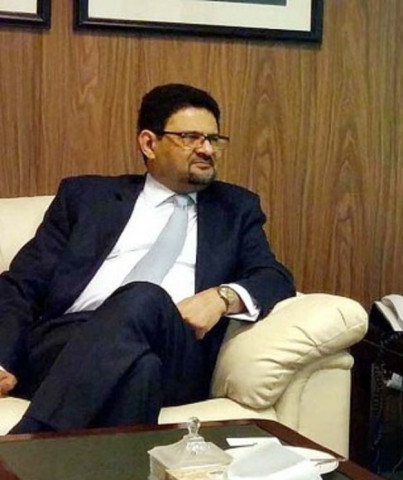Seminar: Adviser terms NFC award formula a structural problem
Calls it imperfect that favours provinces, gives inadequate resources to centre

Calls it imperfect that favours provinces, gives inadequate resources to centre PHOTO: APP
The adviser to prime minister on finance listed the resources distribution formula under the NFC among the three most critical structural problems for Pakistan’s economy, bringing a closed-door debate among political parties in the open.
Agriculture sector: ‘Only latest techniques can tackle food needs’
Speaking at a seminar on the state of Pakistan’s economy, Ismail said “devaluation of the exchange rate is the best policy in the hands of the government” to deal with the widening current account deficit - a departure from the policy followed by his predecessor for over four years.
After handing over 57.5% of total taxes collected by the Federal Board of Revenue (FBR) to the provinces, the federal government’s revenues were not sufficient to meet its day-to-day expenses, he said.
He added that the remaining 42.5% was only sufficient for debt servicing and the government was meeting the needs of defence, development, pensions and running its affairs through borrowing.
However, he stressed that the issue along with a flawed agriculture policy and loss-making public sector enterprises had to be addressed by the next government.
Ismail had made a similar speech in a recent National Economic Council (NEC) meeting after Sindh and Punjab objected to growing indebtedness of the country.
The seventh NFC Award expired in 2015 but President Mamnoon Hussain has been giving it yearly extensions due to disagreement between the centre and provinces over the eighth award.
The International Monetary Fund (IMF) has also raised concern over the current NFC distribution formula. Improving efficiency, flexibility and responsiveness of the national fiscal federalism framework would be critical to containing medium-term fiscal risks, said the IMF in its latest report.
It added that there was a need for strengthening the current framework with better alignment of revenue and expenditure responsibilities as well as improved coordination and resource-sharing mechanisms. Under the seventh NFC Award, the centre had enhanced the share of provinces by 10%, but did not transfer additional responsibilities.
The federal government’s move to launch politically motivated schemes like the Prime Minister’s National Health Programme puts a further strain on its resources despite health and education being provincial subjects after the 18th constitutional amendment.
The federal government’s desire to readjust the resource distribution formula cannot be fulfilled until amendments are made in the Constitution.
Ismail was also highly critical of the agriculture policy, arguing that the announcement of crop support prices actually harmed agricultural production.
He called unsustainable the sugarcane support price of Rs180 per 40 kg and said if the provinces were still inclined towards that, then they should give resources from their own pockets.
He declared that the current government could not privatise Pakistan International Airlines (PIA) and Pakistan Steel Mills (PSM) despite making efforts. The next government should make efforts as without fixing public sector enterprises, Pakistan’s fiscal problems could not be resolved, said the adviser.
Ismail said nobody would buy 49% shares in PIA without seeking control of the airline and called for a review of the PIA law that barred the handing over of management control to the private sector.
Agriculture reforms: AMRI develops new agri-machines
Speaking about the two ills of the economy - budget deficit and current account deficit, the adviser said exchange rate devaluation was the best tool to tackle the current account deficit.
He said monetary tightening by the State Bank of Pakistan (SBP) could also help to address the problems, but argued that such decisions were always difficult near the general elections. He hoped that recent monetary tightening and exchange rate devaluation would help contain the current account deficit.
He also underlined the need for containing the oil import bill, which was currently 30% of total imports. “We sell petroleum products too cheap and the government has already reversed this policy.”
Published in The Express Tribune, March 16th, 2018.
Like Business on Facebook, follow @TribuneBiz on Twitter to stay informed and join in the conversation.



















COMMENTS
Comments are moderated and generally will be posted if they are on-topic and not abusive.
For more information, please see our Comments FAQ